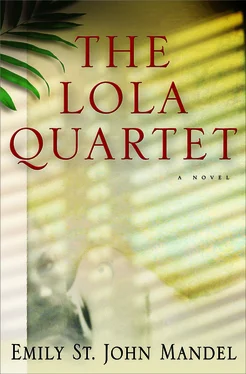There was something familiar about the place. He wandered through the Cinnabon-scented air, looking for anything that might trigger a memory, but he wasn't sure if he'd been here before or if it was just that all malls looked the same to him. He went down to the food court, bought a blueberry smoothie that tasted mostly of sugar, and found a secluded bench beside a pillar. His forehead was damp with sweat beneath his summer fedora. Halfway through the blue smoothie, his cell phone began to ring. Washed-up ex-journalist and reluctant digital photographer Gavin Sasaki contemplates the number on his cell-phone screen for just a moment before he answers.
"How did it go?" Eilo asked.
"Fine. I gave her two thousand dollars."
"Good. That's perfect. You could've gone higher."
"I know," he said. "I started at one."
"Good work. You're going on to the other two houses?"
"I just stopped at a mall for a minute."
"Take your time," she said. "It's a hundred and five degrees today."
The next two houses were easy, although the woman at the second house was crying a little. "We just didn't think it would come to this," she kept saying, and he wanted to tell her about his apartment in New York, the rain dripping silently from the bathroom ceiling and the gaping abyss of his credit-card debt, he wanted to commiserate about ruinous financial decisions and lost homes, but instead he just said "I'm sorry about all this," which was against Eilo's rules. She'd warned that apologies weakened his bargaining position.
He reached an agreement with the tearful woman, and the drive back to Eilo's house was long and still. The heat made everything unreal. Palm trees in the distance separated from the earth and floated upward. There was something dreamlike about the movement of cars on the expressway, false lakes shimmering on the pavement ahead. He liked the solitude of driving, all these cars traveling around him with one passenger each. He wondered where Karen was at that moment. Living her life in New York or in some other city, waking each morning and putting on clothes that were unfamiliar to him, perhaps even spending time with someone else by now, a life that he'd slipped out of. Unsettling to think of himself as someone else's memory. He found himself wondering how Anna remembered him.
As i d e f r o m the music, the robin' s-egg-blue headphones, the spray-painted NO s in the park in Sebastian, the scar and the tattoo and the way her hair fell across her face when she leaned over her homework, what he remembered about Anna was that he'd loved her. He couldn't remember her ever being unkind to him, from the day they met in a corridor outside one of the band rooms, Sasha's pretty little sister, until she threw a paper airplane at him through the still night air.
On long drives through the suburbs he found himself thinking of Anna constantly. He'd let her slip away so easily. He assumed it was too late to make anything right, for Anna or her daughter, but it had occurred to him that the least he could do was find them.

Night had fallen by the time Daniel's airplane descended into Florida. He picked up his Jeep and drove the long straight road from Boca Raton to the city of Sebastian, a haze of insects in the air around every streetlight. Impossible not to dwell on the ragged decade that stood between today and the last time he'd gone to Utah, the marriages and divorces, his children, the guilt and the disappointments. He was calmer now that he was home. The blessed familiarity of these streets. Terrible to have to give the inheritance to Paul, but it seemed to him that paying off Anna's debt was honorable, and the idea of honor brought him peace. He drove home to the rented house where he'd been living in the long blank year since his second divorce, showered and drove to his mother's house. His grandmother had been ill for years now, a long slow fade into confusion and morphine, but the fact of her death was still somehow startling to him. His mother's eyes sparkled with tears.
"I'm sorry I wasn't here," he said.
.
Da n i e l w e n t to the funeral two days later, watched as his grandmother's pitifully small coffin was lowered into the earth. Later in the week he came home from a long day of work and three messages blinked on his answering machine. One was from his mother, terse and businesslike—"Call me when you can" — and the other two were hang-ups, the second hang-up preceded by a sigh. He called his mother and listened to her in a state of increasing agitation.
"Wait," he said finally, "I don't understand. How is this possible?"
"As best we can figure out," his mother said, "she decided to invest in a real estate development. The money's gone."
"How could it be gone?"
"It just is," she said tightly. "She made a mistake."
"But she told me. " Daniel was sitting in the shadows of his living room. He hadn't turned on the lights and the light from the street shone blue through the blinds. He felt he might be dreaming. "I just came back from Utah," he said.
"Utah? Were you visiting my sister?"
"I needed the money," he said. "I thought I had it, I thought the will was being settled this week, she told me—"
"What did your grandmother tell you, Daniel?" Her voice was thin. Daniel flinched. She'd just lost her mother and now her son was whining about money.
"I'm sorry," he said.
"She lived a long, full life," his mother said. "If there's no money, Daniel, is it the end of the world? Don't we all have everything we need?"
"You're right," he said. He closed his eyes. "She invested all of it?"
" There wasn't much to start out with," his mother said. "She always talked about how frugal she'd been, all the careful investing she and my dad did, but once we took a look at the accounts, there just wasn't much there. Maybe she thought the real estate development would make her wealthy. Let me put it this way, sweetheart. After the bills for the nursing home and the hospital are settled, after we pay the accountant and the lawyer, I estimate we'll be left with about twelve hundred dollars. I'll split it with you if you want."

In his lost career at the New York Star Gavin had begun all his stories with a new page in his notebook, names and ideas and associations scrawled out into the margins. At the beginning of his second week in Sebastian he drove to an office-supply store and bought notebooks— he couldn't find the kind he liked best, but close enough— and wrote Anna across the top of a page. But where to begin? He had already spent some time trying to find Sasha, but had gotten nowhere. She wasn't in the telephone directory and seemed to be among the disconcerting population of people who don't exist on the Internet. He wrote Sasha buying baby clothes at mall? beneath Anna's name and The Lola Quartet below that. It was evening, the lights of the freeway streaming across the top of his window behind the reflection of the room. He considered for a moment but could think of no other leads, and he was distracted by the distant sounds of Eilo hitting her heavy bag.
Eilo had a heavy bag rigged up in a spare bedroom. She'd had it professionally mounted. The room was otherwise unfurnished. There was only the punching bag hanging still in a corner, Eilo's boxing gloves lined up on the gray carpet below. At five in the morning she was in the punching room and at six she was at her desk. Eilo disappeared occasionally during the day and during these absences Gavin heard the muted sounds of her gloved fists hitting the bag wherever he went in the house, a distant percussion. Afterward she was calmer, more focused, and she returned to work until at least seven or eight in the evening, long past the point when Gavin had stopped even pretending to upload new home listings to the website and was reading the news on his laptop instead. Eventually one of them would say something about pizza or Chinese takeout, and a while later they would be sitting in the living room watching TV and eating off the coffee table. It seemed to Gavin that she liked having him there. She never went out in the evenings.
Читать дальше














